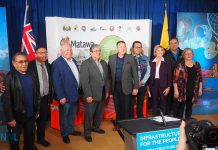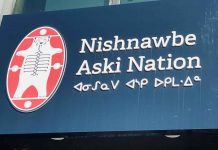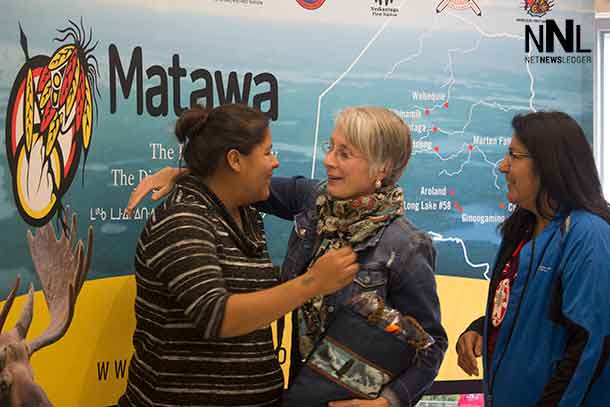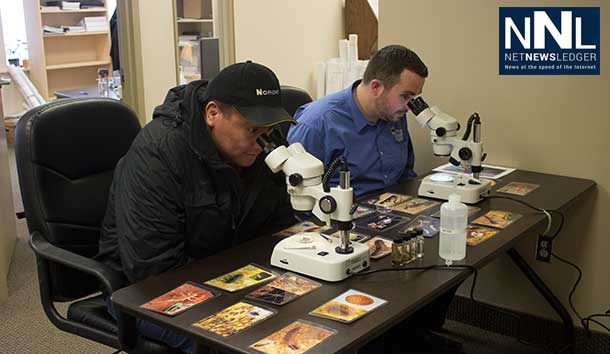
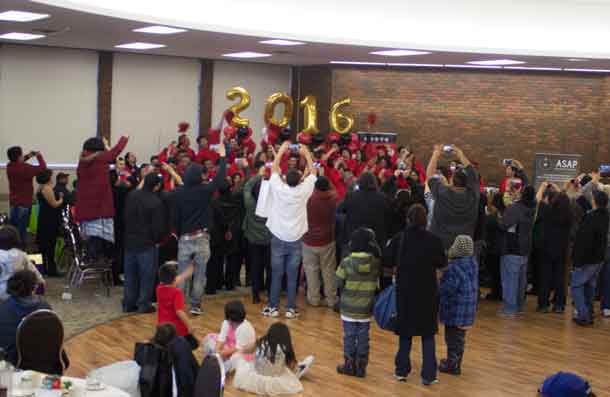
THUNDER BAY – At the Matawa First Nations ASAP Graduation in Thunder Bay on Thursday, one of the speeches delivered to the audience was on behalf of Morris Wapoose.
The KKETS Executive Director was unable to attend in person as he was attending a funeral.
However his address was powerful and deserves a wider audience.
Message from Morris Wapoose, KKETS Executive Director
Today is a special day for ASAP and a special day for 69 individuals graduating from the program with an Ontario Secondary School Diploma.
And an important feature to note is in the Matawa First Nations region there will be many employment opportunities made available to Matawa community members. And our graduates will be ready for employment.
Presently there are very few Matawa members who have the skills and training required to participate in the mineral exploration, mining development and transportations sectors. Because construction and permanent mine employment are still a few years away, there is time to prepare Matawa members for them to take advantage of the opportunities such as jobs in the mining industry.
Information that is maintained by the Ministry of Northern Development Mines (MNDM) suggests that only five percent of the employment in an operating mines site will be available to people with less than a completed high school education.
The surge in the mining sector heightens the need for current high school students to remain in school and complete their Ontario Secondary School Diploma (OSSD).
While good and reliable Aboriginal information is hard to obtain, it is widely accepted that many Matawa members are in their prime labour force years of 16-55 years old. The communities in Matawa, like many other aboriginal communities have increased a population explosion that results in estimates of a 27 % increase.
Regional demographics suggest that there has been an Aboriginal population change, 33.9% increase for the Northwest and 44.1% increase in the North East respectively.(Rosehart:2008) The 15-35 age cohort, in particular, is projected to grow by 37% compared to 6% for the general population. (As Hull cited in INAC 2008) this age group in the Aboriginal population is behind 25% in the required qualifications.
In spite of a variety of focused initiatives over the past 25 years, much remains to be done to achieve higher secondary school success rates and quality elementary school experiences for Ontario’s Aboriginal students living in First Nation communities. (Rosehart 2008). It is estimated that the high school graduation rate for Aboriginal youth is 28% lower than general average for Canadians. The low education level makes it imperative for the Matawa communities to plan and take action.
Now is the time for Matawa First Nation people to be in the preparatory phases of achieving high school status and to consider other specialized training. MNDM information suggests that the following breakdown of education level pre-requisites for on the mine site employment.
15% will need University
45% will need College
35% will need a minimum of Grade 12
5% with grade 12 or less Source: MNDM
The information indicates that 80% of the permanent mining jobs require a High School or College education and only 15% are at University level. Matawa and its leadership are ready to target their labour force of the eighty percentile with permanent mining employment opportunities. In support of the workforce development, Matawa has already taken numerous steps and has implemented various program initiatives like the Aboriginal Skills Advancement Program (ASAP) and Ring of Fire Training Alliance (RoFATA) training. Both of these programs are showing positive results. Workforce development is a high priority among the Matawa leadership and their communities.
Did you know the unemployment rate for Aboriginals is twice the rate in comparison to non- Aboriginals in Canada..13% compared to 6%
Did you know that 35% of the Status Indians in the working population has less than high school which increases by 10% in remote areas.
Labour market census says Aboriginals in the working age 25-64 years has increased by 21% since last census in 2007. However our employment rate has remained the same.
This is why it is important to develop a culturally and socially appropriate adult education such as the Aboriginal Skills Advancement Program (ASAP) for our membership.
ASAP originated as a pilot back in 2012 when MTCU provided KKETS the opportunity for Matawa First Nation members to attain their high school diploma. In the pilot year, KKETS offered the GED and OSSD programs and successfully achieved 62 student successes where 3 GED students out of 20 passed and the remaining 59 students achieved the OSSD status. Due to the GED’s rigid learning structure to the learner, lack of success and the employer’s demand for high school diploma attainment, KKETS made the decision to only offer OSSD in the ASAP program.
As a result of its pilot successes and demand for the program by its Matawa First Nation members, KKETS submitted a renewal proposal to MTCU to deliver the program again for another year and was successful in achieving 64 OSSD graduates in 2014/15.
In March 2015, ASAP reached a total of 527 applications and achieved a 126 student success rate. These results and demand for such an adult high school education, allowed KKETS to submit another renewal proposal to MTCU but requesting a multi-year funding agreement. KKETS was approved on a 3-year funding year agreement of 2015-2018 to educate 300 Matawa First Nation members which brings us here today to celebrate the first of the three year agreement where ASAP has achieved 69 high school graduates.
After 3 years of delivering ASAP, this unique flexible adult education program is achieving results and is meeting the needs of our membership to acquire their high school diploma in approximately 10 months. ASAP has now produced a total of 195 high school graduates. Many of our graduates have gone into Ring of Fire Aboriginal Training Alliance (RoFATA) trades training – 69 graduates, where 48 graduates have gone onto post-secondary education or 34 graduates have entered the workforce. Our ASAP and RoFATA programs are meeting the labour market demands of producing individuals with the right education, skills and training in preparation for mining.
However it’s important to note, these results wouldn’t be achieved without everyone’s contribution and it’s important to acknowledge the people involved in making our programs a success:
- Matawa Chiefs and KKETS’ Board of Directors for the support and direction
- Suzanne LaFrance and Carolyn Zadnik for creating this program behind the scenes back in 2012 –
- Jean-Guy Frechette and staff of Ministry of Training, Colleges and Universities(MTCU) in 2012 for providing and supporting KKETS in this opportunity
- MTCU for the 3 year multi-funding year agreement (2015-2018) – other staff involved – Taunya Paquette, Linda Peart, Alyne Bigwin
- MNDM’ Gravelle’s Office, Lori Churchill, Jennifer Heneberry for their support in what KKETS does
- MCSS Ontario Works (Paul Baldassaro, Darlene Pavletic, Laura Pitura, Jennifer Lible to name a few names) for our partnership in supporting ASAP students to continue receiving their income supports while enrolled in ASAP
- The Federal Government for providing $7.4 million training funds
- Lakehead Adult Education Centre and its teachers for the delivery of academic instructional services and flexibility to accommodate to the learner’s needs
- KKETS’ ASAP staff for providing program and student supports including Elder Gerry Marten for being available in providing cultural supports to our students
- Externals partners – Confederation College, LiUNA, Roots to Harvest
- And there are so many others that have contributed and supported KKETS programs indirectly
In closing, the demand for KKETS continues to grow and has reached a high of over 1000 applications where it is KKETS’ goal to continue in providing this education/training opportunity (ies) to its membership where Matawa First Nation members will be able to compete and be active participants in Canada’s labour force.
With that being said, both ASAP and RoFATA initiatives need to continue to meet the demands of the people and labour market needs through continuing and sustaining a long-term relationship with both Provincial and Federal Governments. Both programs achieve the outcomes of: to prepare, to educate and to train for employment. If you are prepared, educated and trained, you will be ready for employment.
In closing, I would like to congratulate all 69 students who are graduating from the ASAP program with a high school diploma and wishing each and every one of them a success in their journey.
Miigwetch
Morris Wapoose, KKETS Executive Director


